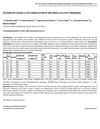 33 citations,
August 2015 in “F1000Research”
33 citations,
August 2015 in “F1000Research” New model shows muscle affects hair loss differently in men and women.
 14 citations,
December 2020 in “Journal of The American Academy of Dermatology”
14 citations,
December 2020 in “Journal of The American Academy of Dermatology” More people, especially Hispanic/Latinx, in certain NYC communities experienced temporary hair loss during the COVID-19 pandemic.
9 citations,
September 2009 in “PubMed” Antigen presenting cells around hair follicles are crucial in SLE-related hair loss.
 27 citations,
January 2002 in “Exogenous Dermatology”
27 citations,
January 2002 in “Exogenous Dermatology” Chronic exposure to sunlight may worsen male pattern baldness and protecting the scalp from the sun could slow it down.
 December 2015 in “Journal of Psoriasis and Psoriatic Arthritis”
December 2015 in “Journal of Psoriasis and Psoriatic Arthritis” A patient experienced long-lasting hair loss after using acitretin for psoriasis.
 15 citations,
March 2015 in “Australasian Journal of Dermatology”
15 citations,
March 2015 in “Australasian Journal of Dermatology” Seborrhoeic dermatitis may cause a condition called "seborrhoeic folliculitis," leading to chronic scalp inflammation and scarring hair loss.
July 2013 in “Indian Journal of Dentistry” A 46-year-old man showed symptoms of a rare condition usually seen in postmenopausal women, highlighting the need for dentist-dermatologist collaboration.
 1 citations,
January 2021 in “Skin appendage disorders”
1 citations,
January 2021 in “Skin appendage disorders” Chemotherapy patients don't all lose their hair due to factors like hair growth rates, age, genetics, and the type of drugs used.
4 citations,
November 2017 in “PubMed” Miracle fruit seed oil significantly reduces hair breakage in women with damaged hair.
 October 1996 in “Dermatologic Clinics”
October 1996 in “Dermatologic Clinics” Research on hair disorders has advanced, with promising future progress in understanding and treating these conditions.
 February 2021 in “Journal of pharmaceutical and biological sciences”
February 2021 in “Journal of pharmaceutical and biological sciences” No cure exists for alopecia areata, and treatments are personalized.
 21 citations,
March 2006 in “Seminars in Cutaneous Medicine and Surgery”
21 citations,
March 2006 in “Seminars in Cutaneous Medicine and Surgery” Most hair loss disorders can be accurately diagnosed and treated in an outpatient setting.
 9 citations,
April 2005 in “PubMed”
9 citations,
April 2005 in “PubMed” Older female squirrel monkeys often experience a type of hair loss similar to chronic telogen effluvium in humans.
 January 2024 in “Editora Científica Digital eBooks”
January 2024 in “Editora Científica Digital eBooks” Natural substances might help with hair loss and scalp problems.
 March 2004 in “Journal of The American Academy of Dermatology”
March 2004 in “Journal of The American Academy of Dermatology” Patients with systemic lupus erythematosus and hair loss had fewer hair follicles and non-scarring alopecia; direct immunofluorescence was not helpful in diagnosing lupus in these cases.
 November 1995 in “Journal of Pediatric Health Care”
November 1995 in “Journal of Pediatric Health Care” Most hair loss in kids and teens is due to common conditions, and hair usually grows back within 6 months.
Low-level light therapy, possibly combined with other treatments, may become a leading hair loss treatment, while hirsutism often worsens with age and lacks preventive options.
 30 citations,
May 1991 in “Psychosomatics”
30 citations,
May 1991 in “Psychosomatics” Some psychiatric medications can cause reversible hair loss.
 12 citations,
December 1985 in “Dicp-The annals of pharmacotherapy”
12 citations,
December 1985 in “Dicp-The annals of pharmacotherapy” Carbamazepine can cause hair loss, which may reverse when the medication is stopped.

Hair loss can happen after severe H1N1 flu but usually grows back in 4 months.
 23 citations,
July 1982 in “International Journal of Dermatology”
23 citations,
July 1982 in “International Journal of Dermatology” The review concludes that accurate diagnosis of different types of hair loss requires proper biopsy techniques and understanding the hair growth cycle and underlying causes.
 23 citations,
June 1976 in “PubMed”
23 citations,
June 1976 in “PubMed” Crash dieting can cause temporary hair loss due to not getting enough energy for hair growth.
 July 2024 in “Influenza and Other Respiratory Viruses”
July 2024 in “Influenza and Other Respiratory Viruses” Analyzing both TE and AA together is crucial for understanding post-COVID-19 hair loss.
 October 2024 in “Cosmoderma”
October 2024 in “Cosmoderma” Proper hair care and suitable products are essential for men's scalp health and well-being.

Treatments for hair loss vary, but cell-based options may be the future.
 June 2024 in “Archives of dermatological research”
June 2024 in “Archives of dermatological research” Dietary supplements might help prevent post-COVID hair loss, but serum ferritin is not a reliable indicator.
 14 citations,
September 2020 in “Clinical, cosmetic and investigational dermatology”
14 citations,
September 2020 in “Clinical, cosmetic and investigational dermatology” The hair serum significantly improved hair growth and reduced hair fall without causing any skin issues.
 January 2025 in “Clinical Cosmetic and Investigational Dermatology”
January 2025 in “Clinical Cosmetic and Investigational Dermatology” Genetic testing is crucial for diagnosing rare hair loss disorders.
 December 2023 in “PubMed”
December 2023 in “PubMed” COVID-19 patients in Thailand typically started losing hair about 30 days after infection, with women experiencing more severe hair loss.
 April 2016 in “Medical Acupuncture”
April 2016 in “Medical Acupuncture” The document concludes that hair loss in women is treated with medications, therapies, and surgery in Western medicine, and with acupuncture and herbs in Chinese medicine, but hereditary hair loss is hard to reverse.


























